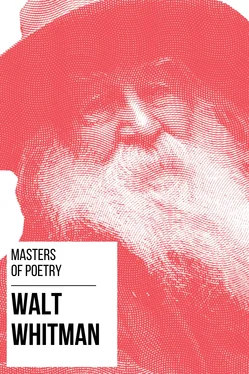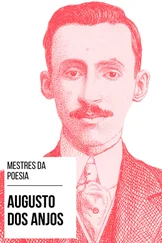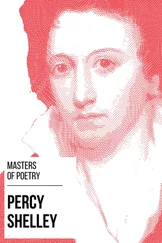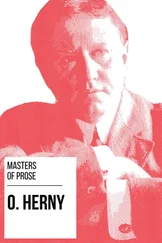"O vapors! I think I have risen with you, and moved away to distant continents, and fallen down there,
for reasons,
I think I have blown with you, O winds,
O waters, I have fingered every shore with you."
The work springs from the modern democratic conception of society,—of absolute social equality.
It embodies the modern scientific conception of the universe, as distinguished from the old theological conception,—namely, that creation is good and sound in all its parts.
It embodies a conception of evil as a part of the good, of death as the friend and not the enemy of life.
It places comradeship, manly attachment, above sex love, and indicates it as the cement of future states and republics.
It makes the woman the equal of the man, his mate and not his toy.
It treats sexuality as a matter too vital and important to be ignored or trifled with, much less perverted or denied. A full and normal sexuality,—upon this the race stands. We pervert, we deny, we corrupt sex at our peril. Its perversions and abnormalities are to be remedied by a frank and fervent recognition of it, almost a new Priapic cult.
It springs from a conception of poetry quite different from the current conception. It aims at the poetry of things rather than of words, and works by suggestion and indirection rather than by elaboration.
It aims to project into literature a conception of the new democratic man,—a type larger, more copious, more candid, more religious, than we have been used to. It finds its ideals, not among scholars or in the parlor or counting-houses, but among workers, doers, farmers, mechanics, the heroes of land and sea.
Hence the atmosphere which it breathes and effuses is that of real things, real men and women. It has not the perfume of the distilled and concentrated, but the all but impalpable odor of the open air, the shore, the wood, the hilltop. It aims, not to be a book, but to be a man.
Its purpose is to stimulate and arouse, rather than to soothe and satisfy. It addresses the character, the intuitions, the ego, more than the intellect or the purely æsthetic faculties. Its end is not taste, but growth in the manly virtues and powers.
Its religion shows no trace of theology, or the conventional pietism.
It aspires to a candor and a directness like that of Nature herself.
It aims to let Nature speak without check, with original energy. The only checks are those which health and wholeness demand.
Its standards are those of the natural universal.
Its method is egocentric. The poet never goes out of himself, but draws everything into himself and makes it all serve to illustrate his personality.
Its form is not what is called artistic. Its suggestion is to be found in organic nature, in trees, clouds, and in the vital and flowing currents.
In its composition the author was doubtless greatly influenced by the opera and the great singers, and the music of the great composers. He would let himself go in the same manner and seek his effects through multitude and the quality of the living voice.
Finally, "Leaves of Grass" is an utterance out of the depths of primordial, aboriginal human nature. It embodies and exploits a character not rendered anæmic by civilization, but preserving a sweet and sane savagery, indebted to culture only as a means to escape culture, reaching back always, through books, art, civilization, to fresh, unsophisticated nature, and drawing his strength thence.
Another of the ideas that master Whitman and rule him is the idea of identity,—that you are you and I am I, and that we are henceforth secure whatever comes or goes. He revels in this idea; it is fruitful with him; it begets in him the ego-enthusiasm, and is at the bottom of his unshakable faith in immortality. It leavens all his work. It cannot be too often said that the book is not merely a collection of pretty poems, themes elaborated and followed out at long removes from the personality of the poet, but a series of sorties into the world of materials, the American world, piercing through the ostensible shows of things to the interior meanings, and illustrating in a free and large way the genesis and growth of a man, his free use of the world about him, appropriating it to himself, seeking his spiritual identity through its various objects and experiences, and giving in many direct and indirect ways the meaning and satisfaction of life. There is much in it that is not poetical in the popular sense, much that is neutral and negative, and yet is an integral part of the whole, as is the case in the world we inhabit. If it offends, it is in a wholesome way, like objects in the open air.
Whitman rarely celebrates exceptional characters. He loves the common humanity, and finds his ideals among the masses. It is not difficult to reconcile his attraction toward the average man, towards workingmen and "powerful, uneducated persons," with the ideal of a high excellence, because he finally rests only upon the most elevated and heroic personal qualities,—elevated but well grounded in the common and universal.
The types upon which he dwells the most fondly are of the common people.
"I knew a man,
He was a common farmer—he was the father of five sons,
And in them were the fathers of sons—and in them were the fathers of sons.
"This man was of wonderful vigor, calmness, beauty of person,
The shape of his head, the richness and breadth of his manners, the pale yellow and white of his hair and beard,
and the immeasurable meaning of his black eyes,
These I used to go and visit him to see—he was wise also,
He was six feet tall, he was over eighty years old—his sons were massive, clean, bearded, tan-faced, handsome,
They and his daughters loved him—all who saw him loved him,
They did not love him by allowance—they loved him with personal love;
He drank water only—the blood showed like scarlet through the clear-brown skin of his face,
He was a frequent gunner and fisher—he sailed his boat himself—he had a fine one presented to him by a
ship-joiner—he had fowling-pieces presented to him by men that loved him;
When he went with his five sons and many grandsons to hunt or fish, you would pick him out as the most
beautiful and vigorous of the gang,
You would wish long and long to be with him—you would wish to sit by him in the boat, that you and he might
touch each other."
All the motifs of his work are the near, the vital, the universal; nothing curious, or subtle, or far-fetched. His working ideas are democracy, equality, personality, nativity, health, sexuality, comradeship, self-esteem, the purity of the body, the equality of the sexes, etc. Out of them his work radiates. They are the eyes with which it sees, the ears with which it hears, the feet upon which it goes. The poems are less like a statement, an argument, an elucidation, and more like a look, a gesture, a tone of voice.
"The word I myself put primarily for the description of them as they stand at last," says the author, "is the word Suggestiveness."
"Leaves of Grass" requires a large perspective; you must not get your face too near the book. You must bring to it a magnanimity of spirit,—a charity and faith equal to its own. Looked at too closely, it often seems incoherent and meaningless; draw off a little and let the figure come out. The book is from first to last a most determined attempt, on the part of a large, reflective, loving, magnetic, rather primitive, thoroughly imaginative personality, to descend upon the materialism of the nineteenth century, and especially upon a new democratic nation now in full career upon this continent, with such poetic fervor and enthusiasm as to lift and fill it with the deepest meanings of the spirit and disclose the order of universal nature. The poet has taken shelter behind no precedent, or criticism, or partiality whatever, but has squarely and lovingly faced the oceanic amplitude and movement of the life of his times and land, and fused them in his fervid humanity, and imbued them with deepest poetic meanings. One of the most striking features of the book is the adequacy and composure, even joyousness and elation, of the poet in the presence of the huge materialism and prosaic conditions of our democratic era. He spreads himself over it all, he accepts and absorbs it all, he rejects no part; and his quality, his individuality, shines through it all, as the sun through vapors. The least line, or fragment of a line, is redolent of Walt Whitman. It is never so much the theme treated as it is the man exploited and illustrated. Walt Whitman does not write poems, strictly speaking,—does not take a bit of nature or life or character and chisel and carve it into a beautiful image or object, or polish and elaborate a thought, embodying it in pleasing tropes and pictures. His purpose is rather to show a towering, loving, composite personality moving amid all sorts of materials, taking them up but for a moment, disclosing new meanings and suggestions in them, passing on, bestowing himself upon whoever or whatever will accept him, tossing hints and clues right and left, provoking and stimulating the thought and imagination of his reader, but finishing nothing for him, leaving much to be desired, much to be completed by him in his turn.
Читать дальше












